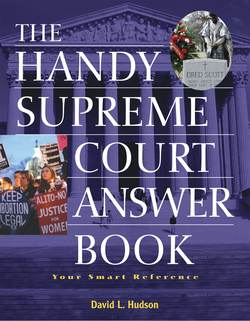Читать книгу The Handy Supreme Court Answer Book - David L Hudson - Страница 273
На сайте Литреса книга снята с продажи.
In what case did the Taney Court rule it could not review a military court decision?
ОглавлениеThe Taney Court ruled that it could not conduct a habeas corpus review of the military trial of outspoken Civil War critic and former U.S. representative Clement Vallandigham of Ohio in Ex Parte Vallandigham (1864). In the spring of 1863, General Ambrose Burnside, without consulting President Abraham Lincoln, had arrested Vallandigham for publicly expressing sympathies for the enemy. At a speech in Mount Vernon, Ohio, Vallandigham said that “the present war was a wicked, cruel, and unnecessary war, one not waged for the preservation of the Union, but for the purpose of crushing out liberty and to erect a despotism.”
Fort Sumter flies under a Confederate flag on April 4, 1861. President Abraham Lincoln issued an order to block Confederate ports despite the lack of a formal declaration of war by Congress. The U.S. Supreme Court ruled in The Prize Cases that the president had the constitutional authority to do that. Hulton Archive/Getty Images.
In May 1863, military officials tried and convicted Vallandigham. Instead of throwing him in jail, President Lincoln ordered him moved to Murfreesboro, Tennessee, in the Confederacy. Vallandigham appealed to the U.S. Supreme Court; it ruled in February 1864 that it did not have jurisdiction to entertain a review of the military court ruling. “The Supreme Court of the United States has no power to review by certiorari the proceedings of a military commission ordered by a general officer of the United States Army, commanding a military department,” Justice James Wayne wrote for the Court.
